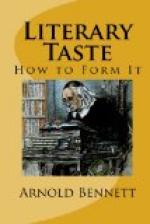Some biographical information about Lamb should be acquired. There are excellent short biographies of him by Canon Ainger in the Dictionary of National Biography, in Chambers’s Encyclopaedia, and in Chambers’s Cyclopaedia of English Literature. If you have none of these (but you ought to have the last), there are Mr. E.V. Lucas’s exhaustive Life (Methuen, 7s. 6d.), and, cheaper, Mr. Walter Jerrold’s Lamb (Bell and Sons, 1s.); also introductory studies prefixed to various editions of Lamb’s works. Indeed, the facilities for collecting materials for a picture of Charles Lamb as a human being are prodigious. When you have made for yourself such a picture, read the Essays of Elia the light of it. I will choose one of the most celebrated, Dream Children: A Reverie. At this point, kindly put my book down, and read Dream Children. Do not say to yourself that you will read it later, but read it now. When you have read it, you may proceed to my next paragraph.
You are to consider Dream Children as a human document. Lamb was nearing fifty when he wrote it. You can see, especially from the last line, that the death of his elder brother, John Lamb, was fresh and heavy on his mind. You will recollect that in youth he had had a disappointing love-affair with a girl named Ann Simmons, who afterwards married a man named Bartrum. You will know that one of the influences of his childhood was his grandmother Field, housekeeper of Blakesware House, in Hertfordshire, at which mansion he sometimes spent his holidays. You will know that he was a bachelor, living with his sister Mary, who was subject to homicidal mania. And you will see in this essay, primarily, a supreme expression of the increasing loneliness of his life. He constructed all that preliminary tableau of paternal pleasure in order to bring home to you in the most poignant way his feeling of the solitude of his existence, his sense of all that he had missed and lost in the world. The key of the essay is one of profound sadness. But note that he makes his sadness beautiful; or, rather, he shows the beauty that resides in sadness. You watch him sitting there in his “bachelor arm-chair,” and you say to yourself: “Yes, it was sad, but it was somehow beautiful.” When you have said that to yourself, Charles Lamb, so far as you are concerned, has accomplished his chief aim in writing the essay. How exactly he produces his effect can never be fully explained. But one reason of his success is certainly his regard for truth. He does not falsely idealise his brother, nor the relations between them. He does not say, as a sentimentalist would have said, “Not the slightest cloud ever darkened our relations;” nor does he exaggerate his solitude. Being a sane man, he has too much common-sense to assemble all his woes at once. He might have told you that Bridget was a homicidal maniac; what he does tell you is that she was faithful. Another reason of his success is his continual regard for beautiful things and fine actions, as illustrated in the major characteristics of his grandmother and his brother, and in the detailed description of Blakesware House and the gardens thereof.




